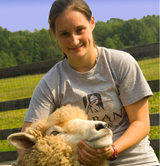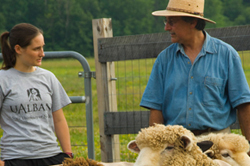July 28, 2008
UAlbany Students Tackle Sustainability at Professor's Farm
 |
|
UAlbany student Erin LaBarge with one of the ewes she studies at Longfield Farm. (Photo Mark Schmidt) |
When he goes home, he is a farmer. Kleppel rises at 3:30 a.m. to take care of the hormone-free sheep and free-range chickens he raises with his wife Pam at Longfield Farm in Altamont, N.Y. They bought Longfield in 2000.
"Initially, I started farming because I study the factors that produce different kinds of land use patterns, particularly suburban sprawl. I knew that one of the most effective ways to prevent land from being developed is to keep it profitable for the people who own large tracts of land. Many of those people are or were farmers," Kleppel said. While he started out with little knowledge of farming, he "found a great deal of satisfaction in working with animals and the plants in our pastures and gardens. One reconnects with something fundamental, perhaps primal, in agriculture."
Joining his knowledge of biodiversity with his new life as a farmer has resulted in benefits to University at Albany biology students, the UAlbany Farmers' Market, and the larger community. This summer UAlbany student Erin LaBarge, a Dean's and President's List biology major, is working with Kleppel on research addressing the relationships between various breeds of sheep (grazers), and the plant communities of wet meadow ecosystems. LaBarge is earning academic credit through Bio 499, Supervised Research for Seniors.
"We are particularly interested in the ecology of biological invasion (by exotic plants) and the way different sorts of grazers affect that ecology," Kleppel said. The goal is to identify breed-specific adaptations in the sheep that will help control invasive plants while allowing the native plants to re-establish themselves.
The project is demanding and requires a variety of skills. "One minute you're tackling a 200-lb. ewe, the next, you're identifying a delicate plant barely surviving in the shade of a clump of invasive reed canary grass," he said.

|
|
UAlbany student Erin LaBarge studies biodiversity with biologist Gary Kleppel. (Photo Mark Schmidt) |
In the course of teaching Experimental Ecology (Bio 327), Kleppel hosts Sustainable Sundays on the farm for groups of UAlbany students. "When you're sitting at the edge of a pasture, dotted with fluffy white sheep, with the beautiful fall foliage all around you, munching on warm bread that you just baked, something happens," said Kleppel. "A light comes on. Suddenly you 'get it'."
Kleppel also bakes bread for the UAlbany and Altamont farmers' markets. Last fall, he installed a wood fired hearth, based on an ancient Tuscan design.
Beyond living out his belief in sustainability, Kleppel is furthering the academic careers of his students. He routinely brings UAlbany pre-veterinary students to work on the farm. In order to gain acceptance to veterinary medical school, the students need experience working with large animals. "One student, Sarah Gangadin, worked with producers of sheep, Scottish Highland cattle and Shire horses (large draft animals)," said Kleppel. This spring Gangadin was accepted by four veterinary medical schools; she starts at the University of Minnesota in the fall, he said.
![]() For more news, subscribe to UAlbany's RSS headline feeds
For more news, subscribe to UAlbany's RSS headline feeds




